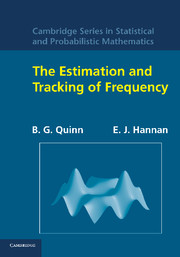Book contents
- Frontmatter
- Contents
- Preface
- 1 Introduction
- 2 Statistical and Probabilistic Methods
- 3 The Estimation of a Fixed Frequency
- 4 Techniques Derived from ARMA Modelling
- 5 Techniques Based on Phases and Autocovariances
- 6 Estimation using Fourier Coefficients
- 7 Tracking Frequency in Low SNR Conditions
- Appendix. MATLAB™ programs
- References
- Author index
- Subject index
5 - Techniques Based on Phases and Autocovariances
Published online by Cambridge University Press: 05 August 2012
- Frontmatter
- Contents
- Preface
- 1 Introduction
- 2 Statistical and Probabilistic Methods
- 3 The Estimation of a Fixed Frequency
- 4 Techniques Derived from ARMA Modelling
- 5 Techniques Based on Phases and Autocovariances
- 6 Estimation using Fourier Coefficients
- 7 Tracking Frequency in Low SNR Conditions
- Appendix. MATLAB™ programs
- References
- Author index
- Subject index
Summary
Introduction
There are several types of frequency estimation techniques which we have not yet discussed. In particular, we have not paid any attention to those based on autocovariances, such as Pisarenko's technique (Pisarenko 1973), or those based on phase differences, for complex time series, such as two techniques due to Kay (1989). We have not spent much effort on these for the very reason that we have been concerned with asymptotic theory and asymptotic optimality. That is, for fixed system parameters, we have been interested in the behaviour of frequency estimators as the sample size T increases, with the hope that the sample size we have is large enough for the asymptotic theory to hold well enough. Moreover, we have not wished to impose conditions such as Gaussianity or whiteness on the noise process, as the latter in particular is rarely met in practice. Engineers, however, are often interested in the behaviour of estimators for fixed values of T, and decreasing SNR. The usual measure of this behaviour is mean square error, which may be estimated via simulations. Such properties, however, may rarely be justified theoretically, as there is no statistical limit theory which allows the mean square errors of nonlinear estimators to be calculated using what are essentially limiting distribution results. Although the methods mentioned above are computationally simple and computationally efficient, we shall see that they cannot be statistically asymptotically efficient and may even be inconsistent, i.e., actually converge to the wrong value.
- Type
- Chapter
- Information
- The Estimation and Tracking of Frequency , pp. 125 - 179Publisher: Cambridge University PressPrint publication year: 2001

